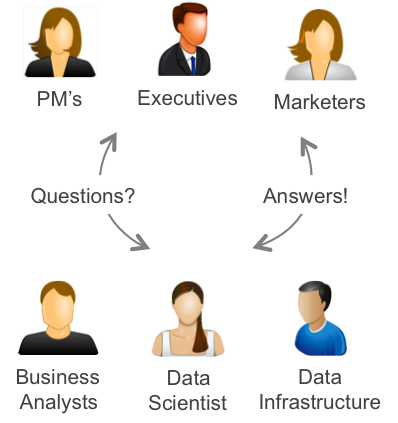Self-Service Analytics Save Both Data Scientists & Data-Curious Teams
By Scuba Educators
At Scuba Analytics, we love data scientists: not only do they share our passion for data, they enable enterprises to be data-informed. However, these PhD-wielding coders are outnumbered by business people, their many questions, and massive volumes of data.
Fortunately, self-service analytics empower business users to explore data themselves, to understand the business and the behavior of customers. This frees up data scientists to work on more technically challenging projects.

Large quantities of data and questions
Companies have long understood that there is value in their data--thus, they save it. Lots of it. The volume of questions arising in data-informed companies is often as large as the volume of data. As more employees experience the power of data exploration, they want access to their data. They bring their expectations from internet research to data analysis: fast results, many exploration cycles, iterating in rapid succession.
Overwhelming data scientists
Data scientists combine mathematical, coding, and business skills in order to discover insights into a company’s “Big Data.” Enterprises cannot hire enough of them, as the typical exploration cycle starts with a business user wanting an answer to a specific question. They frequently do not have the skills to write a massive SQL query or MapReduce job, so they go to their data scientist and explain their question. Sometime later, the data scientist returns with the answer, only to be instantly asked the next question.
Simple questions
Frequently, initial questions in data exploration cycles are rather common: counts and basic groupings. These should not require Ph.D.’s, and yet these questions are what data scientists can spend the majority of their time answering. Even intermediate questions about cohorts, sessions, or funnels should be simple enough for everyone to ask on their own. Business users can get frustrated with the time it takes to answer.
Self-service analytics to the rescue
Self-serve analytic tools like Scuba save data scientists time and enable business people to be data-informed. These tools lower the technical barriers to accessing and analyzing data so that people of varying skill levels can ask day-to-day questions by themselves. Scuba makes rapid iteration a natural workflow, as employees can explore massive volumes of data in seconds. Delivering insights using a self-service model enables all employees to get faster and easier access to data; while letting the data scientists focus on the strategic data initiatives they were hired for.
Blog Categories
Recent Blog Posts
- Crack the Code: How To Maximize Ad Revenue in a Privacy-First World
- MTCDPA: Will Montana’s New Privacy Measure Disrupt the Future of Advertising, and Business?
- Capture Signal Loss with Decision Intelligence
- AWNY24 Session Recap: Privacy Hijacks Signals: Future-Proof 1P Data with Real-Time Data Collaboration
- #PROGIONY: Game-Changers, Fading Fads, and the Future of Advertising
- Publishers’ Responsibilities in the Age of Signal Loss
Popular Blog Posts
- Diving Deeper into Analytics: How SCUBA Fills the Gaps Left by GA4
- 48 Analytics Quotes from the Experts
- 10 Great Examples of Hyper-Personalization in Entertainment & Media
- Data Bias: Why It Matters, and How to Avoid It
- It's Time to Stop Being “Data-Driven” (And Start Being Data-Informed)
- 27 Amazing Tech and Product Blogs: Theory, Tactics, Frameworks




